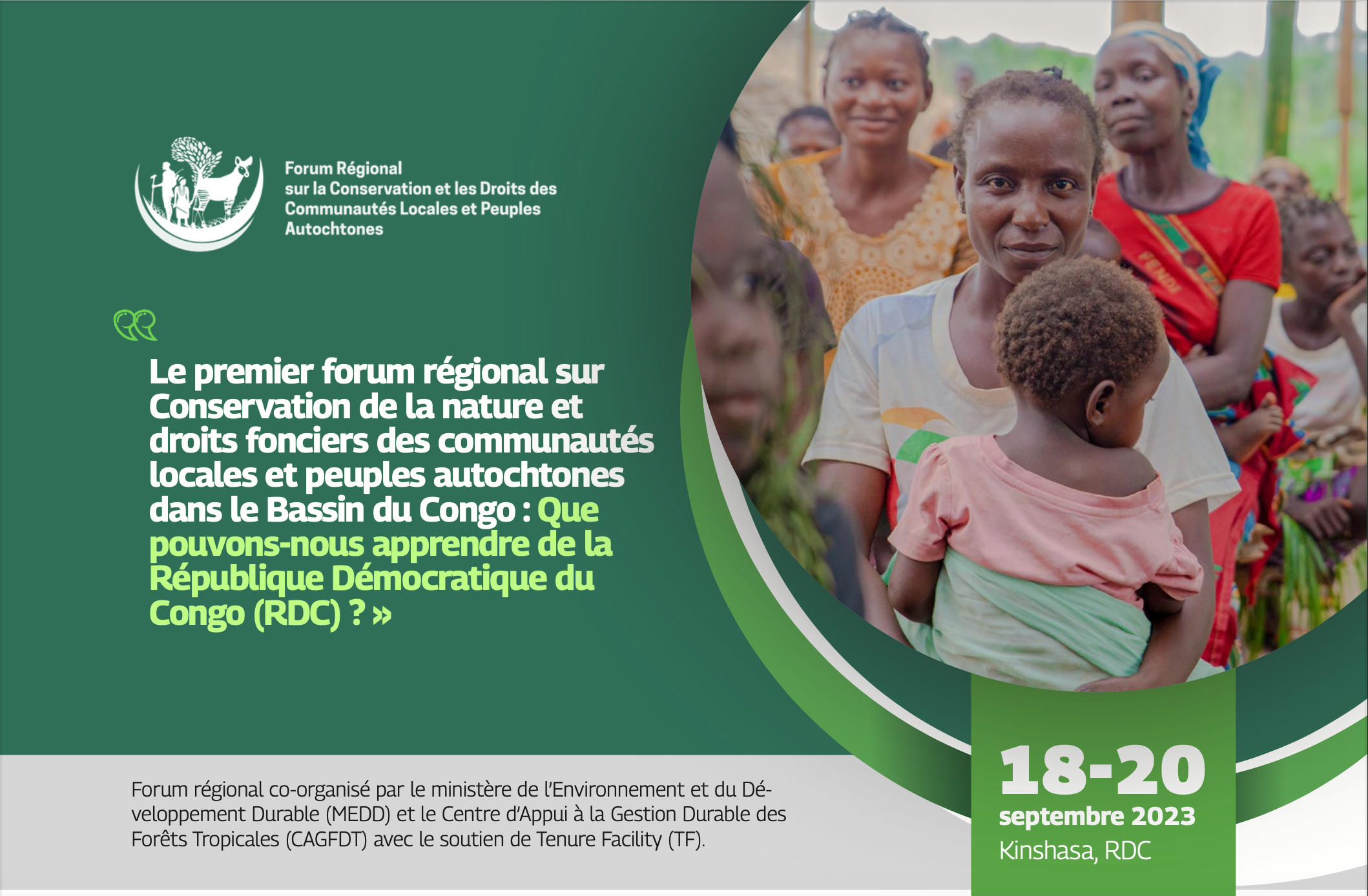2023-09-18
A widely attended Learning Exchange showcases lessons from community-led forestry in the Congo Basin.
Tenure Facility is partnering with the Centre for Sustainable Management of Tropical Forests (CAGDFT) and the Democratic Republic of Congo (DRC) Ministry of the Environment and Sustainable Development in a major regional event focused on community forestry and community-led conservation.
Taking place in Kinshasa from 18-20 September, the Learning Exchange marks a significant contribution to efforts to share lessons from the DRC’s experiences and to mobilize resources for Indigenous and community resource rights and forest management. Community-led forestry management marks a new paradigm in driving local conservation efforts in the DRC, which can improve livelihoods while reducing deforestation and protecting biodiversity.
“This Learning Exchange represents one of the largest gatherings of its kind on the African continent,” Nighisty Ghezae, Acting Executive Director of the Tenure Facility, said in welcoming participants. “The DRC has been at the forefront of recognizing this crucial role that community-led forestry management plays in driving local conservation efforts, reducing deforestation, and protecting nature. These efforts have significant additional benefits, by strengthening communities; improving livelihoods and opportunities for women and young people; and helping to reduce conflict.”
“We at the Tenure Facility are very encouraged by the attention this forum has attracted,” she added. “It underscores our firm belief that Indigenous Peoples’ communal land rights and conservation are inseparable.”

Sharing lessons to generate results
As part of its efforts to share lessons and build capacity, Tenure Facility works alongside local or Indigenous Peoples organisations to ensure that projects are strategic, feasible, and can go to scale by influencing and contributing to broader national programmes. In addition, project partners often share lessons with other communities and local governments that generate results in the surrounding area beyond the initial project.
The Learning Exchange is entitled ‘Nature conservation and land rights of local communities and Indigenous Peoples in the Congo Basin. What can we learn from the Democratic Republic of Congo?’ In attendance are leading delegates from the DRC and foreign governments and international institutions, as well as global funders and organisations focused on Indigenous Peoples’ land rights, conservation and the environment.
During the forum, participants will have the opportunity to examine case studies and testimonies from the field on the relationship between community land rights and nature conservation. In addition, working group sessions will focus on community forestry as a mechanism to help achieve the 30×30 biodiversity target set out by the UN Biodiversity Conference (COP 15) in 2022.
The Congo Basin comprises the world’s second largest tropical forest region and is vital to carbon sequestration, global biodiversity and ecosystem conservation. Like many countries around the world, its vast rainforests face various challenges related to deforestation, illegal logging and environmental degradation.
"We at the Tenure Facility are very encouraged by the attention this forum has attracted. It underscores our firm belief that Indigenous Peoples’ communal land rights and conservation are inseparable."
Supporting global biodiversity efforts
But by recognizing the importance of involving local communities in forest management, the DRC government has taken a lead in uniting community-based forestry management and conservation to help achieve the 30×30 biodiversity.
In 2022, the government joined the High Ambition Coalition for Nature and People (HAC). It has also signed a partnership agreement with the International Union for Conservation of Nature (IUCN) to develop its national and regional strategies to achieve the 30×30 target with the support of international donors.
Local assemblies and government officials have approved Simple Forest Management Plans for 13 community forestry concessions with a total of 196,000 hectares in the DRC. The communities involved established communal tree nurseries with support from the CAGDFT project. Six of these Simple Forest Management Plans were prepared in 2023 and seven in the previous year. Tenure Facility is currently engaging with partners in a comprehensive new strategy to promote large community-managed forest concessions in the eastern DRC.
Tenure Facility currently supports the Projet d’appui à la sécurisation des droits fonciers et forestiers, tout en renforçant la résilience des populations autochtones et des communautés locales (PASDFF) II programme in six DRC provinces, with the aim of securing 200,000 hectares of forest. With a view to expanding these activities in the DRC, Tenure Facility is engaged in dialogues to form partnerships with organisations in Tshopo, North Kivu, South Kivu and Tshwapa and launch programmes in these provinces.
Giving a voice to Indigenous Peoples
The Learning Exchange supports Indigenous Peoples and local communities in ensuring their voices are heard on land rights issues and conservation policies. In addition, the event helps contribute to the Tenure Facility’s efforts to share knowledge and create a vibrant community of practice.
This forum will highlight the contribution of law to biodiversity conservation in the Congo Basin. It also seeks to draw lessons from existing programmes in the sub-region so that the role of communities as partners in conserving biodiversity can be strengthened in order to achieve the 30×30 objectives.
Articles